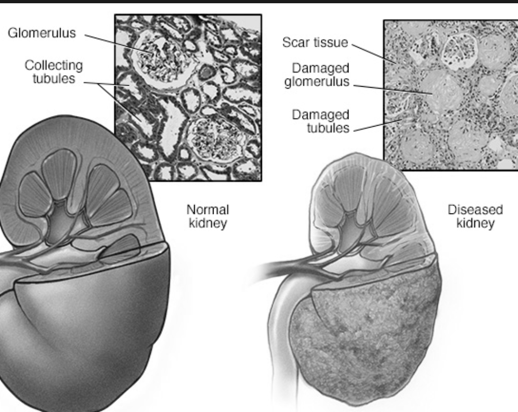Heart health and kidney health are strongly connected. As early as 1974, doctors noted that kidney failure patients on dialysis have a high incidence of cardiovascular problems. A review article from 2005 reports that death from cardiovascular illness is 375 times higher in dialysis patients aged 25 to 35, compared to those with normal kidney function. The authors conducted a comprehensive literature search to see whether patients in the early stages of kidney disease also have increased risk for cardiovascular disease. Their conclusion was yes, impaired kidney function causes damage to the heart and blood vessels well before kidney failure is obvious, and the association between kidney disease and heart disease is comparable to the link between diabetes mellitus and heart disease.
Heart disease puts stress on the kidneys also. Cardiorenal syndrome is defined as a spiral of worsening heart disease and kidney disease. Treatment of this condition is a challenge, according to a review from the Cleveland Clinic, because most of the evidence for treating heart failure comes from clinical trials that excluded patients with significant kidney disease.
In writing these articles, I find one of the main challenges to be translating the terminology used in medical journals. In ordinary life, organ “failure” implies that the organ is not working at all. Kidney failure can be a long-term condition because of dialysis treatment, but heart failure? I was surprised to read that “one third to one half of patients with heart failure develop renal insufficiency” in Reference 2. I used to think 100% of patients with heart failure would have failure of all the other organs. But medical terminology is different. Heart failure means the heart is still pumping, but not as efficiently as it should.
There is good news from a 2009 report in the British Medical Journal. In a study of 27,939 women over age 45, mild kidney impairment was not associated with cardiovascular disease or death. According to the National Kidney Foundation, normal kidneys produce a glomerular filtration rate (GFR) of at least 90 ml/min for the standard 1.73 square meters filtration area. GFR values of 60 to 90 are characteristic of Stage 2 chronic kidney disease. (Stage 1 has normal GFR, but abnormal protein in the urine.) The British study showed that women with GFR less than 60 were at increased risk for death from cardiovascular disease, but women with GFR between 60 and 90 had no increased risk.
References:
Vanholder R et al, “Chronic kidney disease as a cause of cardiovascular morbidity and mortality”, Nephrology Dialysis Transplantation 2005; 20:1048-56.
Geisberg C et al, “Addressing the challenges of cardiorenal syndrome”, Cleveland Clinic Journal of Medicine 2006 May; 73(5): 485-91.
Kurth T et al, “Kidney function and risk of cardiovascular disease and mortality in women: a prospective cohort study”, British Medical Journal 2009; 338:b2392.
Linda Fugate is a scientist and writer in Austin, Texas. She has a Ph.D. in Physics and an M.S. in Macromolecular Science and Engineering. Her background includes academic and industrial research in materials science. She currently writes song lyrics and health articles.






Add a CommentComments
There are no comments yet. Be the first one and get the conversation started!